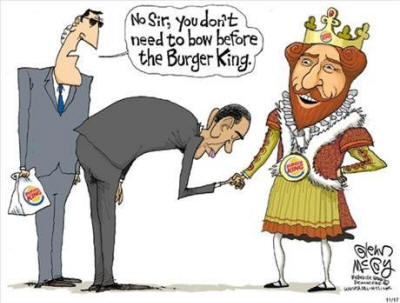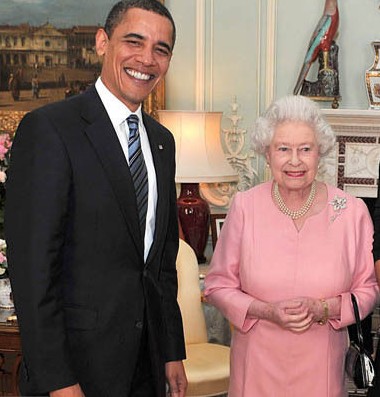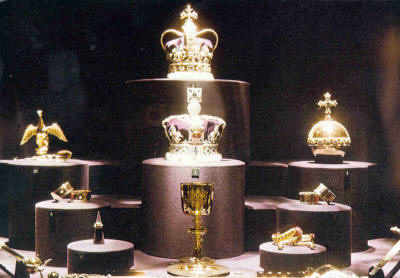
by Holly Greig
July 29, 2010
from
MoneyTeachers Website
Part 1
"In the mid-1700s the American Colonies
were prospering, in part because they were issuing their own money
called "Colonial Scrip," which was strictly regulated and did not
require the payment of any interest.
When the bankers in Great Britain heard
this, they turned to the British Parliament, which passed a law
prohibiting the Colonial Scrip, forcing the colonists to accept the
"debt" or "fiat" money* issued by the Bank of England.
Contrary to what history teaches, the
American Revolution was not ignited by a tax on tea. According to
Benjamin Franklin, it was because "the conditions [became] so
reversed that the era of prosperity ended."
He said:
"The Colonies would gladly have
borne the little tax on tea and other matters had it not been
the poverty caused by the bad influence of the English bankers
on the Parliament, which has caused in the Colonies hatred of
England and the Revolutionary War."
(Source)
When the
Treaty of Paris was signed in 1783,
most Americans thought that total Independence from England had been won.

The fact of the matter, however, is that true
Independence from England never really materialized:
"Working with Hamilton, (Aaron) Burr helped
raise subscriptions (shares) for a private company to improve the water
supply of pestilence-ridden Manhattan, but Hamilton and Burr also
secured a charter (underwriting) from the
Bank of England.
New Yorkers were shocked to learn that the
surplus capital from the venture had been used to establish the Bank of
Manhattan, as the BNY was first known.
Twenty-five thousand shares were issued, of which 18,000 were held by
investors in England. The Bank of England loaned the United States money
in exchange for securities of the United States.
Now the creditors of the United States, which included the Bank of
England, wanted to be paid the interest on the loans that were granted
to the United States. So Hamilton came up with the bright idea of taxing
alcohol. Consumers resisted, so President Washington sent out the
militia to collect the tax - which they did.
That episode became known as the Whiskey
Rebellion."
(Source)
In essence, the "Whiskey Rebellion" was fought
to oppose the first version of the Internal Revenue Service.
That is, the first attempt by the government of
the United States to collect interest for the "Banksters" through the use of
force. Note that the first unofficial Bank of the United States was 72%
owned by "investors" in Great Britain.
I have argued in past articles that this was the
true price of peace with England, allowing the Crown and the Banksters to
continue to profit from our labors through the use of loans and currencies.
Under the "Articles of Confederation", the government was too weak to
collect taxes from its citizens. This was one of the gaping flaws exposed by
the "Whiskey Rebellion". It was also a reason not to invest in an American
Chartered Bank. After the passage of the Constitution, this was no longer an
issue. Yet, we still see the creation of the First National Bank with 40%
foreign ownership by the Banksters of England.
Going from 72% to 40% foreign ownership can be seen as a partial victory.
Yet, it was hardly enough to placate those that
wanted a clean break from the British and their Bank of England. In 1811 the
First Bank of the United States was dissolved. The primary argument being
that "States Rights" gave the States, not the Federal government, the right
to control currency.
Interestingly enough, this move gave more power to Bank of New York and its
British Investors. At least in the commerce capital of the United States,
New York City.
But, banksters being banksters,
they wanted the whole enchilada. The British instigated for War through
kidnapping American sailors and impressing them into the British Navy. The
War of 1812 had begun.
The British won and the 2nd National Bank was created.
Again, the British owned a significant share in
the operation and charged interest for using their worthless paper currency.
"The Second BUS was still controlled by the
Bank of England and foreign investors, who not only profited greatly by
charging interest for the use of their paper American currency, but
England still resented American independence."
(Source)
With the demise of the 2nd National
Bank and the creation of state chartered institutions, the balance of power
still remained in the hands of the British Banksters through the Bank of New
York and other foreign owned banking institutions.
They were behind the "Panic of 1837" by
insisting on payment to them be made in gold and silver. Much of the State
and local Currencies were backed by real-estate. This demand for gold and
silver forced local banks to foreclose on real-estate. The result was gross
devaluations of land that was sold for the only real wealth in America, gold
and silver.
Abraham Lincoln favored a National Bank, but without the foreign ownership
and political manipulation:
"The Eastern banks had agreed to a $150
million government loan package just after the Civil War commenced in
1861. They would resell U.S. bonds in England with the Barings and
Rothschilds, putting the United States at the mercy of the British
aristocracy.
In December 1861, President Lincoln's own
financial plan was presented by Treasury Secretary Salmon Chase (a
free-trade liberal sweating and agonizing in the President's harness), and
by Lincoln himself.
Its measures included:
-
a nationally regulated private banking
system, which would issue cheap credit to build industry
-
the issuance of government legal-tender
paper currency
-
the sale of low-interest bonds to the
general public and to the nationally chartered banks
-
the increase of tariffs until industry
was running at full tilt
-
government construction of railroads
into the middle South, promoting industrialism over the Southern
plantation system
Lincoln was no friend to the "Banksters". This,
more than anything else, led the British to support the Southern States in
the Civil War.
We will continue this discussion in the next
article.
Part 2
In our previous article we demonstrated that,
through our National Banks, Great Britain was able to receive all of the
benefits of occupation without any of the expense.
By earning interest on our currency since
colonial times, they have managed to enslave an unwitting American populace
to their political, economic and global agenda.

Abraham Lincoln was a Patriot that
recognized the stranglehold and sought to break it.
In return, the Bank of England, through the
Banks of New York, sought to break Lincoln.
"On Dec. 28, 1861, the New York banks
suspended payment of gold owed to their depositors, and stopped
transferring to the government the gold which they had pledged for the
purchase of government bonds.
The banks of other cities immediately
followed suit. James Gallatin headed a delegation of bankers who came to
Washington to meet with the administration and Congress.
His program contradicted the President's.
-
First, the Treasury must deposit its
gold in private banks, and let those banks pay the government's
suppliers with checks, keeping the gold on deposit for the
investment use of the bankers.
-
Second, the government should sell
high-interest bonds to these same banks, for them to resell to the
European banking syndicate.
-
Finally, a great deal of the war should
be financed by a tax on basic industry."
(Source)
As you can see, the
Bank of England, through the Bank of New
York, intended on using the Civil war as leverage to increase their
stranglehold over the "Colonies".
Lincoln, fortunately, would have none of it.
"Gallatin was shown the door. While Lincoln
fought the Eastern bankers over the national banking system, the
Treasury issued several hundred millions of the new green-colored
currency. Banker Jay Cooke was hired to sell small government bonds to
the average citizens; with 2,500 sub-agents Cooke sold over $1.3 billion
worth of bonds from 1862 to 1865.
President Lincoln pushed for his measure of control over the banking
system, using more of his influence in Congress than on any other issue.
The New England and New York bankers instructed their congressmen, such
as New York's cynical Sen. Roscoe Conkling, to defeat the bill. But
Lincoln's prestige and authority won out, and he signed the National
Currency Act on Feb. 25, 1863, and the National Bank Act on June 3,
1864."
(Ibid)
Lincoln's reforms included:
-
Every Banking Director had to be an
American Citizen.
-
Banks could charge no more than 7% on
loans. If they violated this law they forfeited the loan and had to
pay the borrower 2 times what he paid in interest.
-
Banks could not hold real-estate for
more than 5 years (except for their buildings).
-
"A national bank had to deposit with the
Treasury, U.S. bonds amounting to at least one-third of its capital.
It would receive in return government-printed notes, which it could
circulate as money. Thus the banks would have to lend the government
substantial sums for the war effort, to qualify for federal
charters, and a sound currency would be circulated to the public for
an expanding economy."
-
"Meanwhile, national banks could not
circulate notes printed by themselves. In order to eliminate all
competition with the new national currency, the notes of
state-chartered banks were hit with a massive tax in the following
year."
-
"Most large commercial banks organized
themselves according to the new system, and many new large banks
were formed, as national banks. Despite historically unprecedented
financing needs, the government raised, and printed, the cash to
fight and win the Civil War. With the combination of banking,
tariff, educational, and agricultural measures enacted under Abraham
Lincoln, the United States began the greatest period of industrial
development ever seen anywhere."
(Ibid)
The British
Illuminati Banksters responded to these
reforms in the London Times:
"If this mischievous financial policy, which
has its origin in North America, shall become endurated down to a
fixture, then that Government will furnish its own money without cost.
It will pay off debts and be without debt.
It will have all the money necessary to
carry on its commerce. It will become prosperous without precedent in
the history of the world. The brains, and wealth of all countries will
go to North America. That country must be destroyed or it will destroy
every monarchy on the globe."
(Source)
At this point, it becomes very difficult not to
believe that the Civil War was the result of British interference in
American affairs.
I am convinced that the secession of the South
would never have taken place without the implied support of the Bank of
England and the secret support of the British Bankster establishment.
This sentiment was best publicly expressed by
one of the Bankster's own:
"On October 7 the (British) Chancellor of
the Exchequer, William E. Gladstone, made a notable speech at Newcastle
in which he remarked that no matter what one's opinion of slavery might
be, facts had to be faced:
"There is no doubt that Jefferson Davis
and other leaders of the South have made an army; they are making,
it appears, a navy; and they have made what is more than either-they
have made a nation."
He added,
"We may anticipate with certainty the
success of the Southern States so far as regards their separation
from the North."
Yet, as we shall see, Lincoln had a few tricks
up his sleeve as well...
Part 3
When the
English Aristocracy and their Bankster
Allies opposed Lincoln, in favor of the South, he issued the
Emancipation Proclamation.
The British people were opposed to slavery and
the Proclamation drove a wedge between them and the Crown. In one stroke,
Lincoln destroyed any hope the Southern States had of an open alliance with
England and France.

The Banksters took a new approach.
They focused their efforts at regaining control
of Congress and the Republican Party. Money is the "milk-blood" of politics,
and they prevailed. Lincoln was forced into a series of compromises near the
end of the Civil War that doomed any chance of economic independence from
the Bank of England and her minions in the US.
In the words of the Chancellor of Germany (Otto
Von Bismarck):
"The division of the United States into
federations of equal force was decided long before the Civil War by the
high financial powers of Europe. These bankers were afraid that the US,
if they remained as one block, and as one nation, would attain economic
and financial independence, which would upset their financial domination
over the world."
(Source)
With the passage of the
National Bank Act, Lincoln's plans for true
independence from Great Britain vanished.
"From this point on the entire US money
supply would be created out of debt by bankers buying US government
bonds and issuing them from reserves for bank notes. The greenbacks
continued to be in circulation until 1994, their numbers were not
increased but in fact decreased.
"In numerous years following the war, the
Federal Government ran a heavy surplus. It could not (however) pay off
its debt, retire its securities, because to do so meant there would be
no bonds to back the national bank notes. To pay off the debt was to
destroy the money supply."
(Ibid)
The reality is, that the banksters and the
Bank of England lend our government its currency and charge us interest
for using it (via the bonds backing it).
The other reality is, that the Southern States
were manipulated into a war with the North by their plantation aristocracy,
who, in turn were manipulated by the Banksters of England. The whole goal
was to create debt and financial slavery for ALL of the United States. The
political goal was to keep us chained down to colonial status and destroy
the Republic.
If the Civil War had succeeded, the Northern States would have been claimed
by France, and the South would have gone to England, just as Hamilton had
predicted in the "Federalist".
The Rothschilds in France and England
wanted to end the "Great Experiment" once and for all.
Fortunately for the North, the Czar of Russia had also resisted Rothschild
demands to establish a central bank in his empire. He threatened war with
France and England if they declared war on the Northern States. He even sent
the Russian Navy to back up the threat with force.
The North was able to win the war and Lincoln had the political clout
necessary to destroy the endless outflow of wealth to the English and
French, via the Rothschilds, once and for all. As a result, he was murdered
by their agents.
Rothschild agents in Russia, posing as
anarchists, also tried to dispatch the Czar through various assassination
attempts starting in 1866.
They finally succeeded in 1881.
Next came the attack on the interest-free greenbacks:
"On April 12th in 1866, the
American congress passed the Contraction Act, allowing the treasury to
call in and retire some of Lincoln's greenbacks...
To give the American public the false
impression that they would be better off under the gold standard, the
money changers used the control they had to cause economic instability
and panic the people. This was fairly easy to do by calling in existing
loans and refusing to issue new ones, a tried and proven method of
causing depression."
(ibid)
The
gold
standard was held up by the Banksters as a means of weaning people off
of their free paper currency. Economic instability made the American public
desperate for a solution.
The
Bankster owned media railed against
Lincoln's Greenbacks as the villain, when in fact, it was the removal of
Greenbacks from the system that was causing the chaos.
"The supply of Greenbacks went from:
-
$1.8 billion in circulation in 1866
allowing $50.46 per person
-
to $1.3 billion in 1867 allowing
$44.00 per person
-
to $0.6 billion in 1876 making only
$14.60 per person and down
-
to $0.4 billion only ten years later
leaving only $6.67 per person
-
and a continually growing
population"
(ibid)
With the retraction of the "Greenback",
the Bank of England next sought to remove silver, as legal tender currency
in the United States:
"By 1872 the American public was beginning
to feel the squeeze, so the Bank of England... sent Ernest Seyd, with
lots of money, to bribe congress into de-monetizing silver. Ernest
drafted the legislation himself, which came into law with the passing of
the Coinage Act, effectively stopping the minting of silver that year.
Here's what he said about his trip,
obviously pleased with himself.
"I went to America in the winter of 1872-73,
authorized to secure, if I could, the passage of a bill demonetizing
silver. It was in the interest of those I represented - the governors of
the Bank of England - to have it done. By 1873, gold coins were the only
form of coin money."
(ibid.)
Gold is such a rare commodity that it is
impossible to use it as the only National currency. Silver and Gold
together, have formed the foundation of solid economies throughout the ages.
By removing silver from the equation, the
Satanic Psychopaths were able to create an artificial demand for whatever
currency they wanted to foist upon an unsuspecting public.
More in the next article below...
The Impact of British Colonial Status on the
U.S.
The consequences of our Colonial status with Great Britain can be seen in
our
National Debt (13 trillion dollars and
growing), most of which is debt owed to the
Bank of England
and
the Rothschilds.
It can also be seen in our high tax rates and
the establishment of the Internal Revenue Service, which was created
the same time as
the Federal Reserve.

The IRS is the Bank of England's interest
collection agency.
In other words, we pay tribute to our Queen and
her minions every time we collect a paycheck, and once a year when we fill
out our income tax return.
Even more shocking is the fact that our armed forces, in reality, also serve
the interests of the Crown. This is evidenced by our involvement in
Afghanistan, where we are fighting to protect
Her
Majesty's Royal opium fields.
The Opium Trade which was, at one time, under
the jurisdiction of British-American tobacco (heavy emphasis on the
British).
This can also be seen in British Petroleum's ownership (in partnership with
China) of
the oil fields in conquered Iraq. In fact,
the U.S. is receiving minimal benefits from the war in Iraq, thanks to our
colonial status with Great Britain.
We provide the soldiers, the hardware and the
bloodshed, they provide the ability to cash in on our sacrifice and the
murder of millions of innocent civilians.
Next comes
the oil rich fields of Iran.
Undoubtedly, our Queen and her Rothschild
minions, will cut both Russia and China in on the action like they have done
in Iraq. We will once more provide the cannon fodder, and the military
hardware to do the job. We end up with nothing but blood on our hands, an
empty treasury, and more Bank of England owned debt. They end up with more
lucrative oil contracts.
We go broke and further in debt. They get rich at our expense.
If this had any benefit for the people of Great Britain, their support for
these wars would make sense. However, their aristocracy hates them as much
as they do us. This is evidenced by their own domestic financial problems,
Satanic pedophilia rings that prey on their citizenry, and the shocking
collapse of civil liberties.
Such has been the history of our Western civilization.
The Banksters conspire with the Crown to create
such
luminary psychopaths as Stalin,
Mao and Hitler. Criminal puppets used to depopulate the land
and create massive profits from the goods manufactured in their forced labor
camps. Psychopaths start wars, and wars limit our freedoms and Civil Rights,
making it all the easier to keep us from questioning such a one-sided,
colonial relationship.
Of course the key to severing our ties with the evil and corrupt Satanists
always leads us back to the Rothschild/Bank of England owned
Federal Reserve Bank. An institution of plunder, degradation, and
greed, used to reduce the American people to the status of plantation
slavery.
Yet, it is hard to bring about reform, when the
Satanic Psychopaths have bought up all of the media outlets, politicians and
major political parties.
Our servitude to the Crown will not end on a high note. Now that all the
real wealth, which is gold and silver, has been safely transported out of
this country and into the vaults of the Bank of England, ownership of the
United States can be safely transferred to the Chinese and Russians. The
Democrats have been doing their best to lay the groundwork for this next
"big event".
Undoubtedly, this will involve another World War, since war has
proven useful in establishing such massive slave labor camps in China,
Russia and Eastern Europe.
This will be a war where our defenses will be
compromised by our politicians so that we put up the least amount of
resistance possible to the "hostile takeover".
Then, once the conflict has ended, "made in Amerika" will pay huge dividends
to the Rothschilds, The Crown, and their Chinese/Russian business partners,
while those of us that are left, wonder if any freedom remains, on the other
side of the barbed wire fences.




